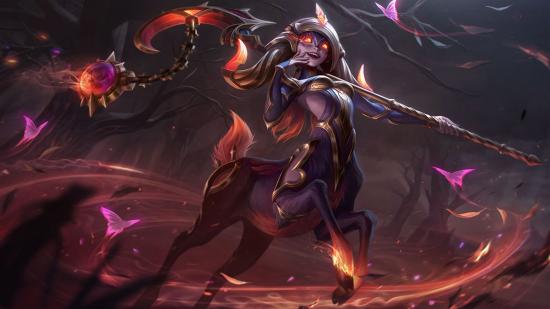The Rainbow Six Siege devs aren’t the only ones with AFKers in their sights at the moment. League of Legends studio Riot Games has posted a dev update running through its approach to the behaviour and plans it’s rustled up to address it going forward – and there are tougher penalties on the way.
The post, noting that AFKing and leaving are “some of the most disruptive behaviours” players face, lays out some coming changes that reflect Riot’s multi-faceted approach to the issue. These are to add new tiers to its penalties so that players who carry on AFKing or leaving “consistently” incur some new punishments, a new penalty type to “shield players from repeat offenders”, and improve the way the system evaluates players’ attempts to change their behaviour for the better.
The new penalty type is called Queue Lockouts, which Riot describes as essentially being “mega-delays” – a step beyond the existing Queue Delays feature. Queue Lockouts will show a pop-up to the player in question explaining their punishment and stopping them from joining MOBA queues for a time, with the duration based on the penalty tier they’re in.
“When we issue a Queue Lockout, we’re not saying, ‘Hey, doesn’t it suck to have your time wasted?’ We’re removing the player from the population for a while so they can’t continue to AFK in games,” the studio explains. Once a player’s Queue Lockout has ended, they’ll still be subject to the “maximum-level queue delay” for the relevant period of time for behaviour-changing reasons and so “players who take a break don’t get to sit out their entire punishment”.

This is where the new tiers come in. There are four new tiers, making a total of seven. The highest is the most serious with a Queue Lockout period of 14 days and the maximum Queue Delay time of 15 minutes for five games (the same as the previous highest, tier three). It’s worth noting that it’s not a time-based system, so the best way to drop down to lower penalties is to play games without AFKing. It’s not something you can wait to tick down on its own.
Finally, Riot says that it’s moved to a “more sophisticated model” that’ll help move reformed players down through the penalty tiers much more effectively than the previous system, so – going forward – if you’re making sure you cut out the AFKing, that should be recognised by the system and you’ll be moved down accordingly. This also means Queue Locking can be based on more certainty that a player has actually been being “consistently disruptive” rather than suffering from poor connectivity or any other unintentional hiccups, which is good news.
Battleborn: Here are the best MOBA games on PC
There’s no word on when these changes will come to the live game just yet, but Riot says that – to make sure everything’s working fairly and as it should – it’ll be testing these new features across a few regions before rolling them out across the board. We’ll make a note in our regular patch notes when they hit the PBE, so keep a weather eye on our site if you’re keen for hear more.
Speaking of which, check out our League of Legends patch 11.19 notes to see what’s coming up for the live MOBA soon.
